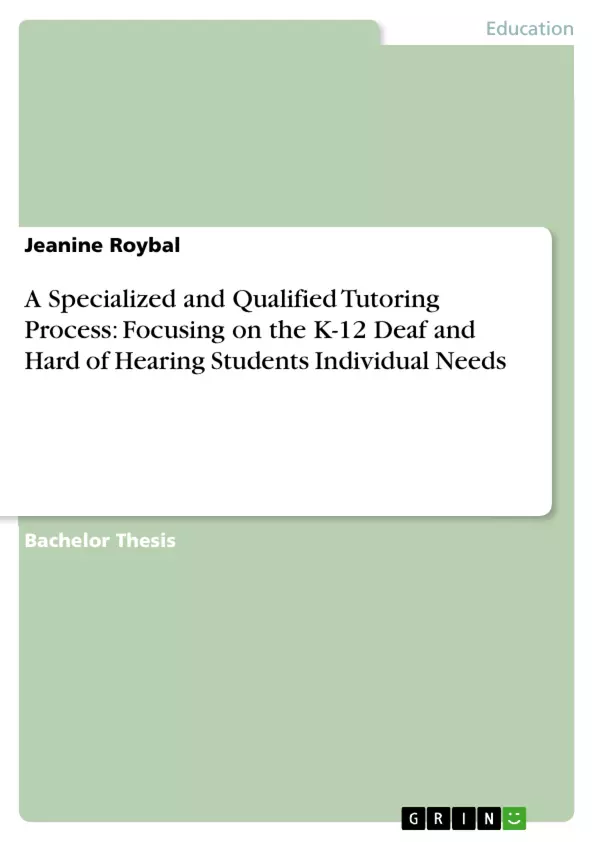Rigorous analysis emphasizes the critical need (while providing the credentials required) for creating a best practice tutoring curriculum process for deaf and hard of hearing( d/hoh) American K-12 special education students. Identifying the unique and individual learning needs and styles of these students is the crux of curriculum development. The creating of a theoretical process for a consistently varying and situational dependent need has not been developed or implemented in this current educational field. This project successfully presents a twenty-first century best practice tutoring curriculum process that converges limited research from the past with the practices in the present; while moralistically holding space for future academic needs to be addressed. This work addresses the current special education crisis by synthesizing and expanding existing mental models in order to develop a successful best practice tutoring curriculum development process that will be repetitively and accurately implemented with appropriate training.
Inhaltsverzeichnis (Table of Contents)
- Abstract
- Acknowledgement
- Introduction
- Statement of Problem
- Purpose
- Definition of Terms
- Literature Review
- Deaf and Hard of Hearing (d/hoh) Students' Needs and Challenges
- Tutoring as an Intervention Strategy
- Best Practices in Tutoring for d/hoh Students
- Methodology
- Findings
- Recommendations
- Conclusion
- Works Cited
Zielsetzung und Themenschwerpunkte (Objectives and Key Themes)
This capstone project aims to address the significant need for a specialized and qualified tutoring process tailored to the individual needs of K-12 deaf and hard of hearing students. The project seeks to develop a best practice tutoring curriculum that acknowledges the unique learning styles and challenges faced by this population.
- The educational challenges faced by deaf and hard of hearing students
- The importance of individualized tutoring for these students
- The development of a best practice tutoring curriculum for deaf and hard of hearing students
- The need for qualified and specialized tutors
- The role of tutoring in promoting academic success for deaf and hard of hearing students
Zusammenfassung der Kapitel (Chapter Summaries)
The abstract highlights the critical need for a specialized tutoring process to address the educational challenges faced by deaf and hard of hearing students. The acknowledgement section recognizes the contributions of various individuals and resources that informed this project. The introduction section outlines the problem statement, purpose, definition of terms, and a comprehensive literature review that examines the unique needs and challenges of deaf and hard of hearing students, the role of tutoring as an intervention strategy, and best practices in tutoring for this population.
Schlüsselwörter (Keywords)
This capstone project focuses on the key concepts of deaf and hard of hearing education, specialized tutoring, best practices, curriculum development, individualized learning, and academic success.
Frequently Asked Questions
Why is specialized tutoring necessary for deaf and hard of hearing (d/hoh) students?
These students have unique learning styles and individual needs that standard tutoring often fails to address, requiring a specialized curriculum and trained professionals.
What are the main educational challenges for d/hoh K-12 students?
Challenges include language acquisition delays, communication barriers in mainstream classrooms, and a lack of individualized intervention strategies.
How does the proposed tutoring curriculum process work?
It utilizes a 21st-century best practice model that synthesizes limited past research with current effective practices to create a repeatable and accurate framework.
What credentials should a qualified tutor for d/hoh students have?
The work emphasizes the need for specific training in d/hoh education, including understanding diverse mental models and situational dependent needs.
Can this tutoring process be implemented on a large scale?
Yes, the project aims to address the current special education crisis by providing a scalable development process that can be accurately implemented with proper training.
- Arbeit zitieren
- Jeanine Roybal (Autor:in), 2011, A Specialized and Qualified Tutoring Process: Focusing on the K-12 Deaf and Hard of Hearing Students Individual Needs , München, GRIN Verlag, https://www.grin.com/document/201667



